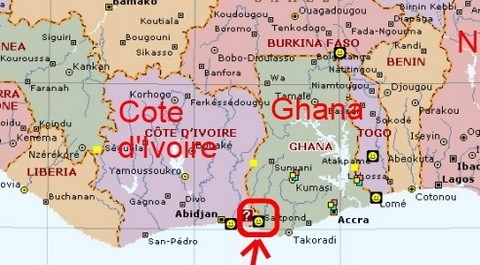
The fate of oil companies such as Tullow and interested parties in the oil fields off the coasts of Ghana and Ivory Coast will be decided today at the Special International Tribunal on the Law of the Sea.
This is because the tribunal is set to rule on an injunction to stop oil exploration in the disputed oil fields.
It has already heard arguments by lawyers of the two countries who are in dispute over portions of the country’s second biggest oil field, Tweneboa Eneryra, Ntome (TEN)
A statement from the tribunal said Judge Boualem Bouguetaia, President of the Special Chamber hearing the case, will read its Order in the provisional measures phase of the case at a public sitting which will be held at 3 p.m in Germany.
Programmes officer at the Africa Centre for Energy Policy, Benjamin Boakye told Joy News in an unlikely event that the tribunal ruled in favour of Ivory Coast, it will have a “serious effect on Ghana’s economy”.
Ghana and its partners have made significant investment into the oil fields and expect returns so if it goes agaisnt Ghana, it would be a big blow, he explained.
“It will be a difficult decision,” should Ivory Coast’s requests be granted, Benjamin Boakye acknowledged.
Ghana, he suggests, may have to sell the second floating production, storage and offloading (FPSO) vessel under construction to pay for its loss, because “it could have very serious implication” for the country.
Ivory Coast has requested the Special Chamber hearing the case to prescribe provisional measures requiring Ghana to:
– take all steps to suspend all ongoing oil exploration and exploitation operations in the disputed area;
– refrain from granting any new permit for oil exploration and exploitation in the disputed area;
– take all steps necessary to prevent information resulting from past, ongoing or future exploration activities conducted by Ghana, or with its authorization, in the disputed area from being used in any way whatsoever to the detriment of Côte d’Ivoire;
– generally, take all necessary steps to preserve the continental shelf, its superjacent waters and its subsoil; and
– desist and refrain from any unilateral action entailing a risk of prejudice to the rights of Côte d’Ivoire and any unilateral action that might lead to aggravating the dispute.
But in its final submission, Ghana requested the Special Chamber to deny all of Côte d’Ivoire’s requests for provisional measures.
The Order will be read in the main courtroom of the Tribunal and the sitting is open to the public. The reading of the Order will be broadcast live on the websites (www.itlos.org and www.tidm.org).


